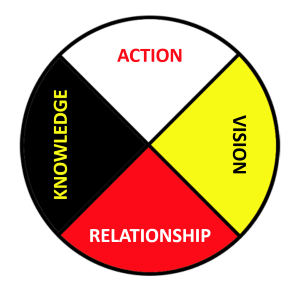Relationships
Contribution by Drew Douglas, CRSP, CHSC, Health and Safety Specialist, Administration, Chippewas of Rama First Nation
Aaniin kina weya, Drew Douglas ndizhnikaaz. Mnjikaning, Chippewas of Rama ndoonjibaa, miinwaa maang ndoodem.
Hi everyone, I am Drew Douglas. I am from the place of the fish fence, the Chippewas of Rama and I am loon clan.
June is Indigenous history month and a time to reflect on the importance of First Nation, Metis and Inuit culture and traditions. As such, I wanted to share a very brief teaching on relationships that was gifted to me by my parents when I started as a safety professional.
Relationships are integral to Anishnaabe culture. In Anishnaabemowin (the language of the Anishnaabe), almost every noun is derived from our relationship to it. For example, the word “chair” is nmadbiwaagan; the word “sit” is nmadbi. So, a better translation of chair is an object to sit on. It is the relationship to the object that is important. Anishnaabe knew the importance of building healthy relationships between everyone in the community. At community gatherings where something needed to be decided, everyone had a chance to speak, even children. Imagine the House of Commons debating a bill, and an eight-year-old standing up and sharing!
Our Visioning Wheel teachings state nothing is accomplished without a relationship. This is why the safety professional needs to have a genuine relationship with everyone from the shop floor to the C-Suite. You are a safety professional that genuinely cares about everyone in your organization. You need to show this love by spending time with each of them; helping, giving and taking from them. Consistent and continued bonding is crucial to this. The more time you spend with someone, the better your relationship will be with them. This seems a simple concept on the surface, but it takes time and effort to implement.
In health and safety, so much emphasis is put on administrative tasks; however, spending time with workers while they have coffee is way more important than finding that piece of evidence you need to pass that audit element.
To Anishnaabe, June is known as odemin (strawberry) dbik giizis (moon). Ode means heart. A better translation for odemin is heart berry. There are so many relationship teachings that have been gifted to us from the strawberry. I’ll share two briefly. First, strawberries grow interconnected and thrive because of this. Draw your own conclusions from that statement. Additionally, they have their seeds on the outside which teaches us vulnerability. Being open and vulnerable will actually build your relationship with someone. This is a hard lesson in western society where we have been taught to hide our vulnerabilities. When you let someone else help you, even if that just means listening to you; you are giving them a gift by taking from them. Relationships are about reciprocity; give and take. All of our seven grandfather teachings are important to relationships, but Humility and Respect are at the centre.
As soon as you finish reading this, get out of the office and spend time with someone in your organization. Connect with them by learning who they are personally. Show them you care about and respect them (give). Show them who you are in an open and humble way (take). Give and take. I guarantee you will be a better safety professional for it.
Baamaa pii. Until we meet again.


